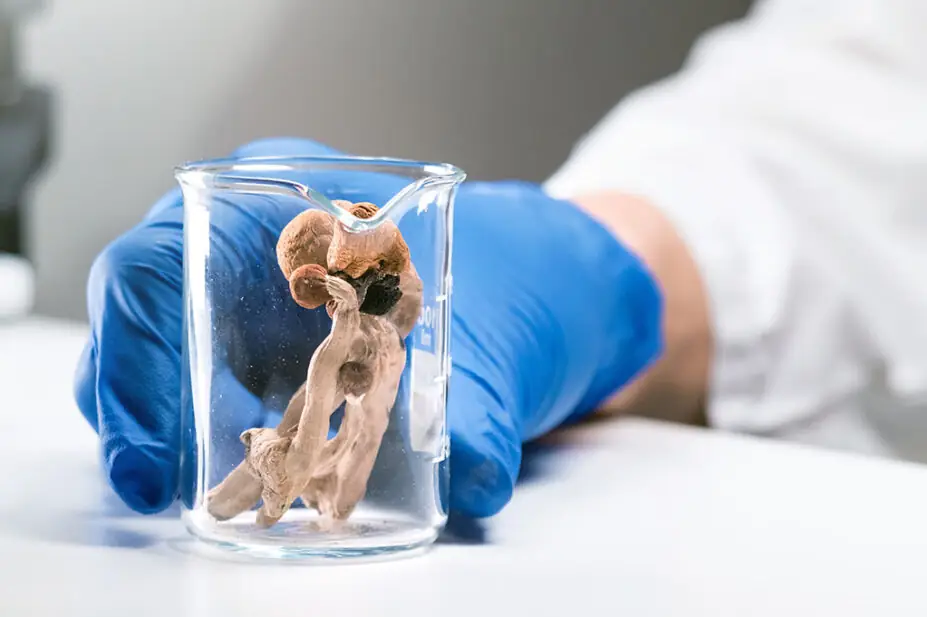
Shutterstock.com
A “UK first” trial will investigate whether psilocybin — the active ingredient in ‘magic mushrooms’ — can help prevent relapse in people recovering from opioid addiction.
The psilocybin study, led by researchers at Imperial College London, will involve 28 participants who have recently undergone detoxification from ‘street’ opioids.
Participants will receive psilocybin therapy at the National Institute for Health and Care Research (NIHR) Clinical Research Facility in Hammersmith, London, alongside psychological support.
The project is one of four funded with a £7m award from the NIHR aimed to reduce harm from illegal drugs.
In a press release published on 18 October 2024, Imperial College said that participants of the “first in the UK” trial would be “closely monitored for effects on their mental health and tolerability of the psilocybin”.
Participants will also be monitored up to six months after receiving psilocybin doses “to track any changes to their opioid use, cravings, mental health outcomes and psychological well-being”.
David Erritzoe, clinical director of Imperial College’s Centre for Psychedelic Research and co-leader of the study, said: “We know that up to 90% of people relapse back to opioid use within 12 months of finishing detox, so finding new and effective treatments is essential. If this trial is successful, it offers hope for a new type of treatment that could make a significant difference to this group of people.
“If our initial trial is successful, we will work to enable the development of further clinical trials in larger populations, to bring a new treatment to patients and the NHS.”
Commenting on the trial, Amira Guirguis, chair of the Royal Pharmaceutical Society’s science and research committee and MPharm programme director at Swansea University Medical School, said: “[The research project] is certainly innovative and could provide valuable insights into novel treatment options for addiction.
“This study’s focus on relapse prevention, rather than just initial detoxification, is particularly compelling, as relapse remains one of the most significant challenges in achieving long-term recovery.”
Guirguis added: “As with all psychedelic therapies, there are regulatory, ethical and clinical concerns to address, particularly ensuring appropriate therapeutic contexts and monitoring. One of the major concerns surrounding psychedelics, including psilocybin, is the potential for adverse psychological experiences, commonly referred to as ‘bad trips’.
“The long-term effectiveness of psychedelic-assisted psychotherapy, particularly in preventing opioid relapse, remains uncertain. Further research is essential to confirm its efficacy, safety and suitability for different patient populations. This is definitely an exciting development. The long-term impact of this research could be transformative, but it will take time to fully understand its role in addiction treatment.”
Colin Davidson, professor of neuropharmacology at the University of Central Lancashire’s School of Pharmacy and Biomedical Sciences, added: “We all know how deadly heroin and fentanyl can be, and we now have the nitazenes, which are new synthetic opioids, flooding the market. Fentanyl is more potent than heroin and many of the nitazenes are more potent than fentanyl, meaning that respiratory depression and death are even more likely from these newer opioids. Thus, new treatments are desperately needed for these dangerous drugs.
“Psilocybin, which is one of the safer drugs of abuse, has proven to be useful in depression and anxiety as well as alcohol and nicotine addiction. If it proves to be useful in opioid use disorder, then, given the current opioid epidemic, it could save many thousands of lives.”
Existing studies have found that psilocybin may be as effective as escitalopram for the treatment of depression, and a study due to finish at the end of 2024 is looking into the drug’s potential for treatment of anorexia nervosa.
The other three studies to be funded by the NIHR will look at:
- Developing a virtual reality-enhanced treatment integrated with a wearable device to improve outcomes for people with cocaine dependence;
- Testing app-coordinated daily bot contact to improve prison release continuity of care for former prisoners; and
- Developing a better way for people with opioid dependence to switch from methadone treatment to buprenorphine long-acting injection.


